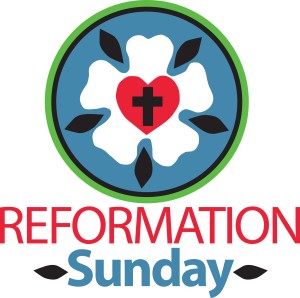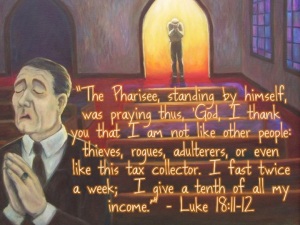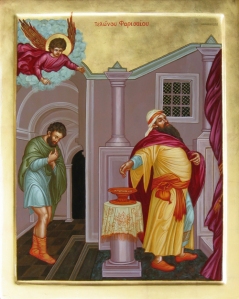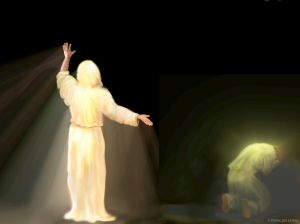“Hide and Seek”
Exodus 33:13-23 and Matthew 11:25-27
July 9, 2017, First Presbyterian Church of Holt

“Peek a boo!” If you’ve spent any time around a young baby, this is a pretty good go-to for entertaining them. Something is there and then it’s not and then it’s there again! Like magic!
Jean Piaget, a developmental psychologist, tells us that this is because of object permanence, which is a fancy phrase for understanding that objects exist even when we’re not experiencing them. A slightly older exploration of this is hide and seek, the joy coming from the anticipation of when you’ll be found.
 Martin Luther and other theologians of his time used their own hide and seek language in relation to God. Deus absconditus, which literally translates to “hidden God.” It’s defined disparagingly to describe God as being so remote that God doesn’t seem to be able to effect any change.
Martin Luther and other theologians of his time used their own hide and seek language in relation to God. Deus absconditus, which literally translates to “hidden God.” It’s defined disparagingly to describe God as being so remote that God doesn’t seem to be able to effect any change.
Luther however, couches it in terms of the things that God tells us about God’s own hiddenness in scripture. Luther refers to Exodus 33, which we read today. Moses asks to experience God, but instead sees only God’s backside.
 Luther writes, “Like Moses, we are denied a direct knowledge of God. Instead, we see God revealed in the cross, the posteriora Dei (backside of God) revealed in the humility and shame of the cross. What is made visible are the very things that human wisdom regard as the antithesis of deity, such as weakness, foolishness, and humility. To those who are not in faith, this revelation is concealed. God is not empirically discernible to be present in the cross of Christ. Those in faith, however, know that concealed in the humility and shame of the cross are the power and glory of God. His strength is revealed in apparent weakness, His wisdom in apparent folly, and His mercy in apparent wrath.”
Luther writes, “Like Moses, we are denied a direct knowledge of God. Instead, we see God revealed in the cross, the posteriora Dei (backside of God) revealed in the humility and shame of the cross. What is made visible are the very things that human wisdom regard as the antithesis of deity, such as weakness, foolishness, and humility. To those who are not in faith, this revelation is concealed. God is not empirically discernible to be present in the cross of Christ. Those in faith, however, know that concealed in the humility and shame of the cross are the power and glory of God. His strength is revealed in apparent weakness, His wisdom in apparent folly, and His mercy in apparent wrath.”
While some would define this as God turning away from God’s people, Luther frames it in terms of opposites. Moses, and by extension all of God’s people, experience God in reversed expectations. God who is invisible, becomes visible in Jesus. God who is all powerful shows God’s self in the humility of the cross.
 In a similar reversal, our New Testament passage speaks of God being revealed to infants, but not to the wise. While I fully acknowledge the irony of talking about the simplicity of thought in a sermon in which I quote Luther’s use of a Latin phrase, I believe our New Testament passage isn’t calling for ignorance, but for looking for God on the margins, in the unexpected places of humility and meekness.
In a similar reversal, our New Testament passage speaks of God being revealed to infants, but not to the wise. While I fully acknowledge the irony of talking about the simplicity of thought in a sermon in which I quote Luther’s use of a Latin phrase, I believe our New Testament passage isn’t calling for ignorance, but for looking for God on the margins, in the unexpected places of humility and meekness.
 Where do you expect to see God? God’s glory is indeed revealed in glowing sunsets and rollings hills,
Where do you expect to see God? God’s glory is indeed revealed in glowing sunsets and rollings hills,  but also in the small dandelion that makes its way through the concrete.
but also in the small dandelion that makes its way through the concrete.  God’s omnipresence is revealed in the vast twinkling sky and in
God’s omnipresence is revealed in the vast twinkling sky and in the intricacies of a mosquito’s wings.
the intricacies of a mosquito’s wings.
 Might you come to know God better through that person in your life who has hurt you as you are moved from bitterness to empathy? Could God show up not in spite of your pain, but within it, the ways your relationships have been formed in the wake of your greatest loss or deepest suffering?
Might you come to know God better through that person in your life who has hurt you as you are moved from bitterness to empathy? Could God show up not in spite of your pain, but within it, the ways your relationships have been formed in the wake of your greatest loss or deepest suffering?
 Columbia Seminary professor, Stanley Saunders wrote, “We are most likely to experience God’s presence and power in the company of the humble and vulnerable, the people who are usually found at the margins… They may be children or strangers, people who are not sure whether or how they fit. They may be poets or artists, who are trained to look at the world differently. Whoever they might be… they will always be people who see what others do not, and thus help the rest of us deal with our blinding arrogance and entitlement. They may be people whose lives challenge the ideals over which we argue and divide.
Columbia Seminary professor, Stanley Saunders wrote, “We are most likely to experience God’s presence and power in the company of the humble and vulnerable, the people who are usually found at the margins… They may be children or strangers, people who are not sure whether or how they fit. They may be poets or artists, who are trained to look at the world differently. Whoever they might be… they will always be people who see what others do not, and thus help the rest of us deal with our blinding arrogance and entitlement. They may be people whose lives challenge the ideals over which we argue and divide.
The empire of heaven, after all, is not an ideal, but a reality made known through real acts and experiences of judgment, repentance, and redemption. The church that banishes the marginal, the vulnerable, and the humiliated does not prevent itself from being subject to the judgment of God; to the contrary, it is precisely through their eyes and voices that we can most clearly discern God’s judgment and mercy, through which our ongoing repentance is made possible. Judgment is a tool God uses to open our eyes and ears, to draw us toward repentance — not to induce brokenness but to uncover and heal what is broken. “
 To believe only in God’s philosophical attributes, omniscience, omnipresence, omnipotence, without knowing God’s willingness to enter into our existence, is to know only one side of God. And I’d go so far as to say, not the most compelling aspects of God. God’s love for us as creator and spirit are deepened through
To believe only in God’s philosophical attributes, omniscience, omnipresence, omnipotence, without knowing God’s willingness to enter into our existence, is to know only one side of God. And I’d go so far as to say, not the most compelling aspects of God. God’s love for us as creator and spirit are deepened through  God’s love for us as the person of Jesus Christ. God literally put God’s skin in the game of humanity by being born as that helpless baby in Bethlehem.
God’s love for us as the person of Jesus Christ. God literally put God’s skin in the game of humanity by being born as that helpless baby in Bethlehem.
 Can you imagine Mary and Joseph playing peekaboo with their little boy? Even in his infant cries and giggles he was the embodiment of the divine… not very intimidating as deities go! As he grew he played his own game of hide and seek, staying behind his traveling group to remain at the temple. That was a terrifying game of hide and seek for his parents! In a role reversal of those early games of peekaboo, that time they were the ones not sure where he had gone.
Can you imagine Mary and Joseph playing peekaboo with their little boy? Even in his infant cries and giggles he was the embodiment of the divine… not very intimidating as deities go! As he grew he played his own game of hide and seek, staying behind his traveling group to remain at the temple. That was a terrifying game of hide and seek for his parents! In a role reversal of those early games of peekaboo, that time they were the ones not sure where he had gone.
 But this is how God operates, showing up over and over again, in the most unexpected places. Even when we aren’t directly experiencing God’s presence, God is indeed there, waiting for us to open our eyes again.
But this is how God operates, showing up over and over again, in the most unexpected places. Even when we aren’t directly experiencing God’s presence, God is indeed there, waiting for us to open our eyes again.
How has your sense of God’s permanence been shaped as you’ve grown in faith? Does God disappear from your life, when you aren’t immediately experiencing God?
 It’s not unfaithful to feel like God is hidden during a season of our lives. In fact, all throughout scripture God plays hide and seek. Throughout Deuteronomy God hides from the children of Israel in response to their selfish sinfulness. In the book of Job, Job has a whole series of losses and pain that would make anyone question where God had gone. In the Psalms, God’s seeming hiddenness is an undercurrent in all the laments.
It’s not unfaithful to feel like God is hidden during a season of our lives. In fact, all throughout scripture God plays hide and seek. Throughout Deuteronomy God hides from the children of Israel in response to their selfish sinfulness. In the book of Job, Job has a whole series of losses and pain that would make anyone question where God had gone. In the Psalms, God’s seeming hiddenness is an undercurrent in all the laments.
It is very human to become frustrated and unsure when we don’t recognize God’s presence in our lives. Recognizing the permanence of God is part of our spiritual development.
 One of the tools that helps children in their understanding of object permanence is the use of words. To this end, the accounts of God in scripture are a tremendous resource towards our understanding of God’s permanence.
One of the tools that helps children in their understanding of object permanence is the use of words. To this end, the accounts of God in scripture are a tremendous resource towards our understanding of God’s permanence.
 In the book “Subversive Spirituality,” Eugene Peterson writes, “Words are our primary tools for getting our bearing in a world, most of which we can’t see, most of which we’ll never touch – this large, expanding, mysterious existence that is so much larger, more intricate, more real even, than we are…When I learn the word “God” I am able to deal with a person I cannot see. God uses words to train us in object permanence…. When we discover that God reveals [Godself] by word, we are back in the realm of the sensory again – a word is spoken by a mouth/lips/tongue/throat; it is heard by ears, or n the case of the written word, seen with eyes. But once the word is uttered and hear, or written and read, it enters into us in such a way that it transcends the sensory. A word is (or can be) a revelation from one interior to another. What is inside me can get inside you – the word does it. Which is why language is the major bridge from basic biology to basic spiritually.
In the book “Subversive Spirituality,” Eugene Peterson writes, “Words are our primary tools for getting our bearing in a world, most of which we can’t see, most of which we’ll never touch – this large, expanding, mysterious existence that is so much larger, more intricate, more real even, than we are…When I learn the word “God” I am able to deal with a person I cannot see. God uses words to train us in object permanence…. When we discover that God reveals [Godself] by word, we are back in the realm of the sensory again – a word is spoken by a mouth/lips/tongue/throat; it is heard by ears, or n the case of the written word, seen with eyes. But once the word is uttered and hear, or written and read, it enters into us in such a way that it transcends the sensory. A word is (or can be) a revelation from one interior to another. What is inside me can get inside you – the word does it. Which is why language is the major bridge from basic biology to basic spiritually.
And why Christian spirituality insists on listening.
By God’s grace, God’s Word is also written. And that makes Holy Scripture the text for Christian spirituality. Holy Scripture is the listening post for listening to God’s Word.”
 As we grow in our faith we are like children learning object permanence, delighting when we sense God once again. After all, God promises never to leave or forsake us (Hebrews 13:5), and that if we search for God, God will be found. (Jeremiah 29:13-14) Thanks be to God. Amen!
As we grow in our faith we are like children learning object permanence, delighting when we sense God once again. After all, God promises never to leave or forsake us (Hebrews 13:5), and that if we search for God, God will be found. (Jeremiah 29:13-14) Thanks be to God. Amen!

















































































































































